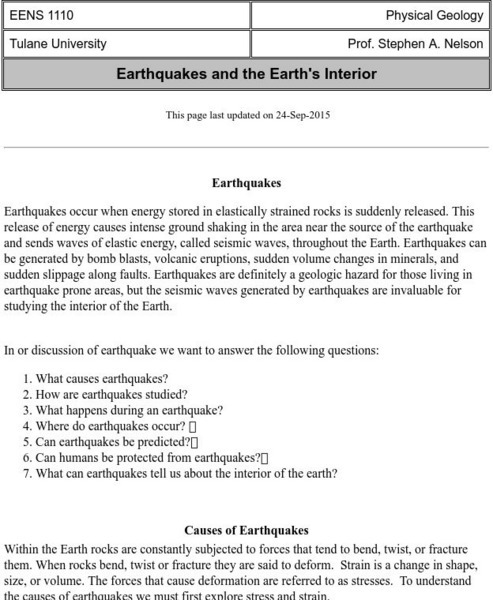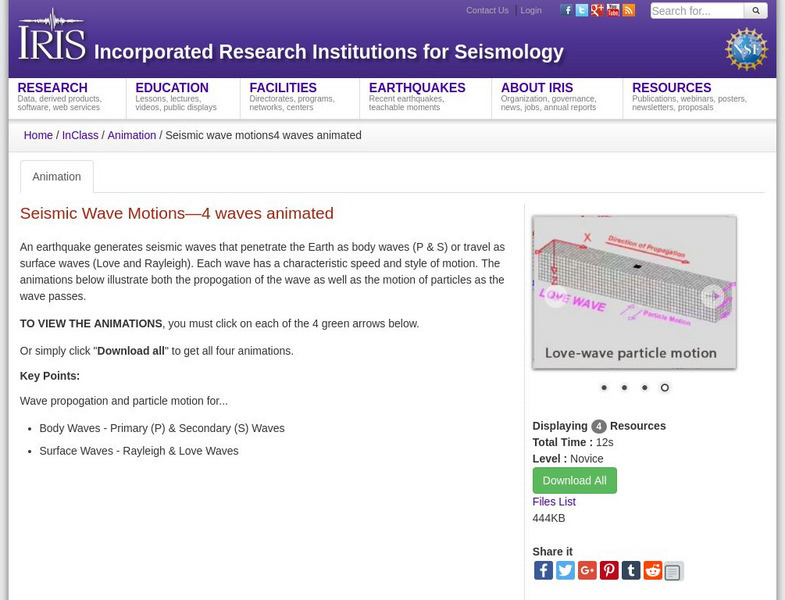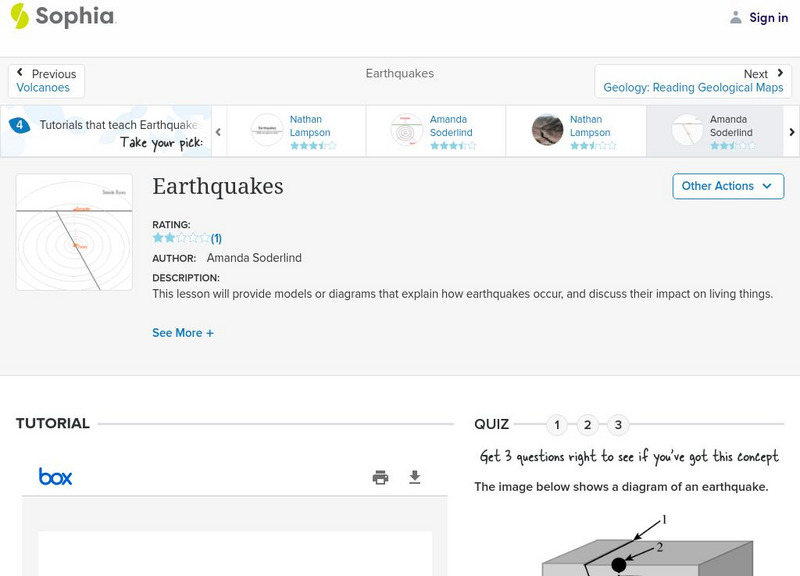Institute of Electrical and Electronics Engineers
Shake it up with Seismographs!
Shake things up in your STEM or earth science classroom when you have small groups construct their own seismographs. A reading assignment on the history of seismographs, the Richter scale, and current technology sets the stage for the...
California Academy of Science
Earthquakes and Tectonic Plates
Here is a comprehensive package in which middle schoolers learn about types of seismic waves, triangulation, and tectonic plate boundaries. Complete vocabulary, colorful maps, and a worksheet are included via links on the webpage. You...
Scholastic
Study Jams! Earthquakes
Have a seismic moment with your class as you show this animated video on earthquakes. Viewers find that quakes occur on faults and are caused by shifting of continental plates. They learn what properties are studied by seismologists and...
Curated OER
What are Earthquakes?
Here is a scientific presentation of earthquakes. The elastic rebound theory is explained, as well as the different types of waves and how they are measured. Just a note: Slide number 15 has a diagram that is upside down. Enable editing...
Curated OER
Vocabulary for Earthquakes and Volcanoes
In this plate tectonics instructional activity, students define 27 terms associated with earthquakes and volcanoes such as subduction zone, mantle, and divergent plate.
Curated OER
Bellwork for Week 9-Earthquakes and Continental Drift
In this earthquake and continental drift worksheet, students answer five questions about continental drift, seismic waves and earthquake safety.
Vision Learning
Visionlearning: Earth Structure: Virtual Journey to Center of the Earth
Find out about the interior structure of the Earth and the role of seismic waves as they move through Earth's layers. The research details both compositional layers as well as mechanical layers.
TeachEngineering
Teach Engineering: Shake It Up! Engineering for Seismic Waves
Students learn about how engineers design and build shake tables to test the ability of buildings to withstand the various types of seismic waves generated by earthquakes. Just like engineers, students design and build shake tables to...
Other
Tech Museum: Building for the Big One [Pdf]
This resource presents a project where students design and build structures that can withstand an earthquake. The project can include an extension where students look at the factors of soil type and proximity to fault in their design....
TeachEngineering
Teach Engineering: Seismic Waves: How Earthquakes Move the Earth
Students learn about the types of seismic waves produced by earthquakes and how they move the Earth. The dangers of earthquakes are presented as well as the necessity for engineers to design structures for earthquake-prone areas that are...
Other
Digital Library for Earth System Education: Living in Earthquake Country
An inquiry unit that teaches students about the how and why earthquakes cause damage and about life in earthquake country. Students specifically learn about: earthquake damage, where earthquake occur, earthquake patterns, seismic waves,...
Other
Tulane University: Earthquakes and Earth's Interior
College instructor's notes on seismology includes earthquake origins, seismic waves, risks and damage assessments, and other information about the interior structure of the Earth.
US Geological Survey
U.s. Geological Survey: Rock'n on Shakey Ground [Pdf]
The basics of earthquake science including factual information about how and why they happen. Also includes some hands-on activities and experiments for students.
Incorporated Research Institutions for Seismology
Iris: Seismic Wave Motions
Four animations showing the movements of surface waves and body waves that are created by earthquakes. Includes P, S, Rayleigh, and Love waves.
Sophia Learning
Sophia: Earthquakes
A quick, introductory lesson about how earthquakes happen, and what impact these natural events have on life.
Incorporated Research Institutions for Seismology
Iris: Seismic Tomography [Pdf]
Learn how seismic tomography imaging helps scientists understand the formation of the Earth's interior.
Exploratorium
Exploratorium: The Faultline/seismic Slinky
A lesson plan for investigating longitudinal waves by use of a Slinky toy. Directions, questions, and applications to seismic waves are provided.
American Geosciences Institute
American Geosciences Institute: Earth Science Week: Modeling Earthquake Waves
Students model earthquake waves with a slinky toy.







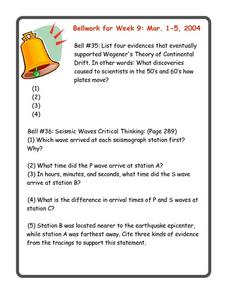
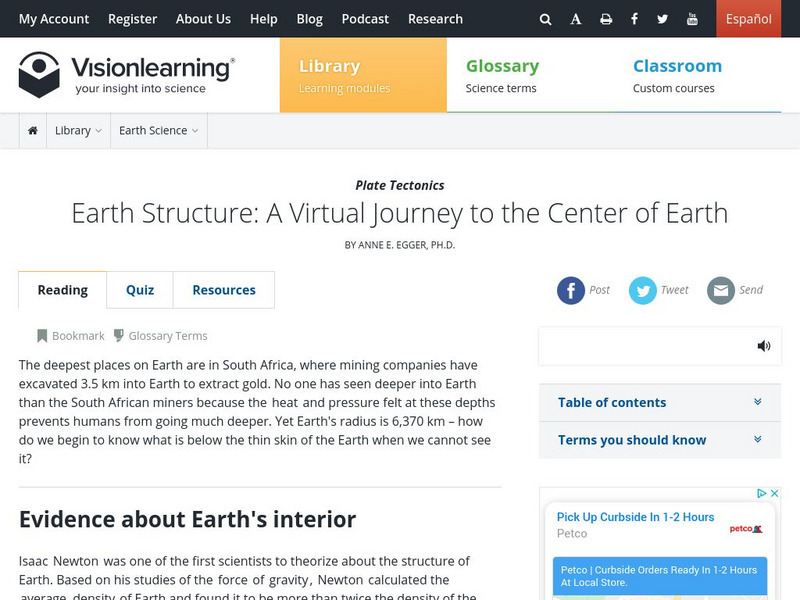
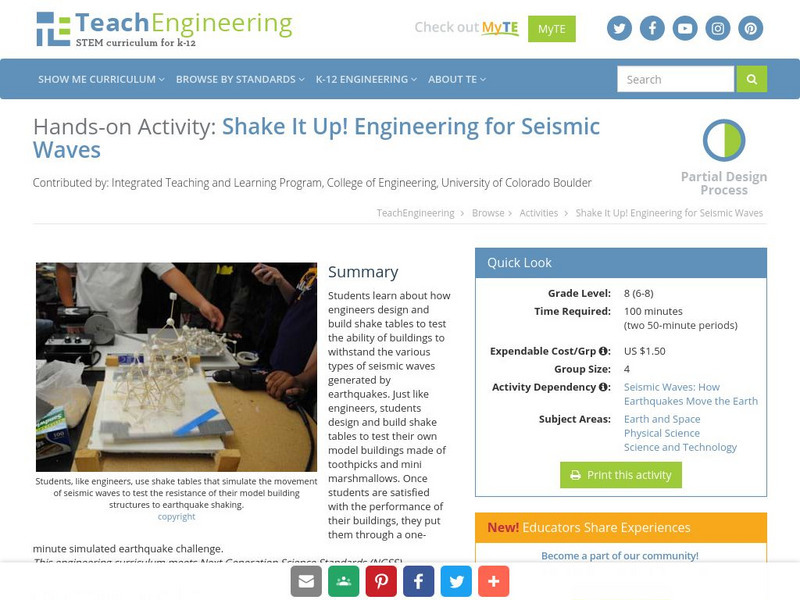
![Tech Museum: Building for the Big One [Pdf] Lesson Plan Tech Museum: Building for the Big One [Pdf] Lesson Plan](http://content.lessonplanet.com/resources/thumbnails/411264/large/bwluav9tywdpy2symdiwmduymc0xmdm2my0xd3vtenpxlmpwzw.jpg?1589993199)


